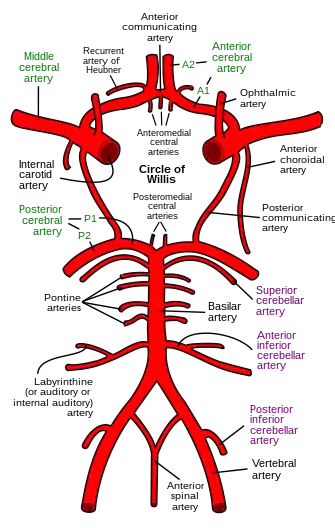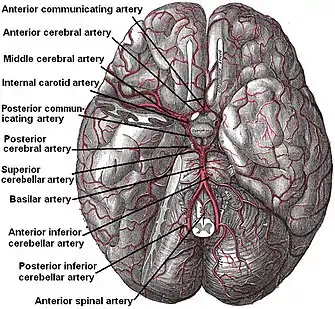Posterior inferior cerebellar artery
The posterior inferior cerebellar artery (PICA) is the largest branch of the vertebral artery. It is one of the three main arteries that supply blood to the cerebellum, a part of the brain. Blockage of the posterior inferior cerebellar artery can result in a type of stroke called lateral medullary syndrome.
| Posterior inferior cerebellar artery | |
|---|---|
 | |
 Diagram of the arterial circulation at the base of the brain (inferior view). PICA is labeled at bottom right. | |
| Details | |
| Source | Vertebral artery |
| Branches | Medial branch lateral |
| Vein | Inferior cerebellar veins |
| Supplies | Cerebellum, choroid plexus of the fourth ventricle |
| Identifiers | |
| Latin | Arteria cerebelli inferior posterior |
| TA98 | A12.2.08.012 |
| TA2 | 4542 |
| FMA | 50518 |
| Anatomical terminology | |
Course
It winds backward around the upper part of the medulla oblongata, passing between the origins of the vagus nerve and the accessory nerve, over the inferior cerebellar peduncle to the undersurface of the cerebellum, where it divides into two branches.
The medial branch continues backward to the notch between the two hemispheres of the cerebellum; while the lateral supplies the under surface of the cerebellum, as far as its lateral border, where it anastomoses with the anterior inferior cerebellar and the superior cerebellar branches of the basilar artery.
Branches from this artery supply the choroid plexus of the fourth ventricle.
Clinical significance
A disrupted blood supply to posterior inferior cerebellar artery due to a thrombus or embolus can result in a stroke and lead to lateral medullary syndrome. Severe occlusion of this artery or to vertebral arteries could lead to Horner's Syndrome as well.
References
![]() This article incorporates text in the public domain from page 580 of the 20th edition of Gray's Anatomy (1918)
This article incorporates text in the public domain from page 580 of the 20th edition of Gray's Anatomy (1918)
External links
- Diseases Database (DDB): 10449
- Anatomy photo:28:09-0225 at the SUNY Downstate Medical Center
- "Anatomy diagram: 13048.000-1". Roche Lexicon - illustrated navigator. Elsevier. Archived from the original on 2014-01-01.
